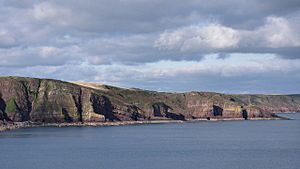Project Neptune (National Trust) facts for kids

Project Neptune is a big, long-term effort by the National Trust. It started in May 1965. The main goal of this project is to buy or protect large parts of the coastline in England, Wales, and Northern Ireland. They want to keep these beautiful areas safe from being built on or used for factories.
The project was also known as Enterprise Neptune when it began. Later, in 1999, it was given a new name: the Neptune Coastline Campaign. It's named after Neptune, who was the Roman god of the sea.
Protecting Our Coastline
The very first piece of land Project Neptune bought was Whiteford Burrows on the Gower Peninsula. This happened when the project first started in 1965. The idea was to make sure these important coastal areas stayed natural and beautiful for everyone to enjoy.
Over the years, Project Neptune has grown a lot. By 1973, they had raised their first big goal of £2 million. This allowed them to look after about 338 miles (544 km) of coastline. By 1986, they had raised even more money, reaching £8.75 million.
By 2009, the project was protecting about 710 miles (1,143 km) of the British coastline. When Project Neptune celebrated its 50th birthday in May 2015, the National Trust had bought 574 miles (924 km) of coastline through this project. This brought their total protected coastline to 775 miles (1,247 km). Later that same year, this increased to 780 miles (1,255 km). This means Project Neptune now protects about 10% of the entire UK coastline! It covers a huge area of 48,800 hectares (120,587 acres).
Famous Places Protected
Project Neptune helps protect some of the most famous parts of the UK coast. This includes land near the amazing Giant's Causeway in Northern Ireland. It also looks after 5.5 miles (8.9 km) of the famous White Cliffs of Dover and the stunning rock formations called The Needles.
The project includes four World Heritage Sites. These are places recognized globally for their special natural or cultural importance. It also helps protect nine lighthouses, which are important for guiding ships.
While Project Neptune has been very successful, it hasn't always achieved every goal. For example, in 1981, their offer of £1 million to buy Land's End was not accepted.
Looking After the Coast
Today, Project Neptune is mostly focused on taking care of the coastline it already owns. This includes important work like coastal management. Coastal management means looking after the beaches, cliffs, and other parts of the coast. It involves protecting them from erosion and making sure they stay healthy for wildlife and people.
 | William Lucy |
 | Charles Hayes |
 | Cleveland Robinson |

